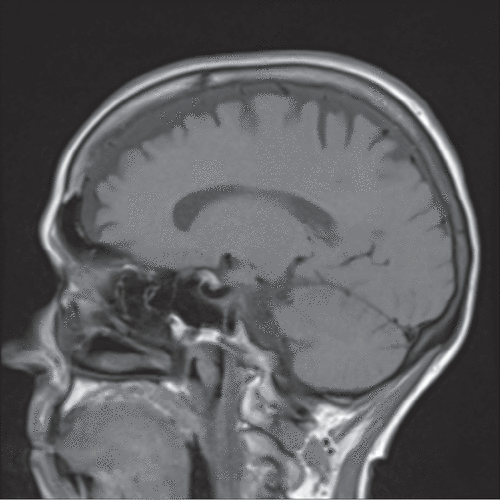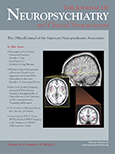Severe Hyponatremia and Seizures Secondary to Psychogenic Polydipsia in a Case of Frontotemporal Dementia
To the Editor: Frontotemporal dementia is a neurodegenerative disease that affects the frontal and temporal lobes and frequently results in perseverative behaviors. Although hyperphagia is frequently reported in frontotemporal dementia, the authors are not aware of any reports of psychogenic polydipsia due to frontotemporal dementia aside from increased alcohol consumption.1,2
Case Report
The patient is a 63-year-old, right-handed, married white woman with a family history of late-onset dementia in her father and no personal neuropsychiatric history. She initially presented with a 1.5-year history of executive dysfunction and confabulation. She also had reportedly lost approximately 130 lbs within the last year through the obsessive use of diet pills and fiber aids. A complete workup that included ruling out metabolic, autoimmune, and neoplastic etiologies of her symptoms was noncontributory. Brain MRIs revealed bifrontal cortical atrophy (Figure 1). Approximately 1 year later, her family brought her to the emergency room with a several-day history of confusion, malaise, and headaches. The patient had a generalized tonic clonic seizure in the emergency room and was found to have a serum sodium level of 108 mmol/L and a serum chloride level of 75 mmol/L. According to the family, the patient had developed excessive water drinking over the last year, drinking directly from the faucet and becoming upset if it was shut off. The husband had also witnessed her drinking from the faucet while urinating at the same time. He would have to shut off the water to the house when leaving to prevent her from drinking excessively and had recently neglected to do so. The patient eventually made a complete recovery from her hyponatremic episode. She was on memantine 10 mg twice daily during the above incident, with no improvements in behavior. Further polydipsia was curbed through behavioral interventions and the use of trazodone 50 mg in the morning and 100 mg in the evening. She has since developed hyperphagia with subsequent weight gain (35 lbs over 10 months).

FIGURE 1. Sagittal Brain MRI of the Patient
Discussion
We report a case of severe hyponatremia from psychogenic polydipsia resulting in seizures in a patient with frontotemporal dementia. Perseverative behaviors are common and burdensome to caregivers. Psychogenic polydipsia may be particularly difficult to manage behaviorally, and pharmacological strategies frequently used to manage frontal lobe symptoms (e.g., selective serotonin reuptake inhibitors) may exacerbate hyponatremia caused by polydipsia.
There is currently no approved treatment for frontotemporal dementia. Previous pilot studies suggested a possible symptomatic benefit with memantine, but two randomized controlled trials failed to show efficacy.3,4 Memantine did not provide symptomatic benefit for this patient. A randomized controlled trial of trazodone for the behavioral symptoms of frontotemporal dementia has shown efficacy5 and was also beneficial for this patient when combined with behavioral interventions.
In summary, perseverative behaviors can be challenging for caregivers and clinicians and may be life threatening. Psychogenic polydipsia is a life-threatening perseverative behavior that can be observed in frontotemporal dementia and can be ameliorated with a combination of pharmacological and nonpharmacological interventions.
1 : Topiramate may modulate alcohol abuse but not other compulsive behaviors in frontotemporal dementia: case report. Cogn Behav Neurol 2008; 21:104–106Crossref, Medline, Google Scholar
2 : Reversal of abnormal eating and drinking behaviour in a frontotemporal lobar degeneration patient using low-dose topiramate. J Neurol Neurosurg Psychiatry 2012; 83:349–350Crossref, Medline, Google Scholar
3 :
4 : Memantine in patients with frontotemporal lobar degeneration: a multicentre, randomised, double-blind, placebo-controlled trial. Lancet Neurol 2013; 12:149–156Crossref, Medline, Google Scholar
5 : Frontotemporal dementia: a randomised, controlled trial with trazodone. Dement Geriatr Cogn Disord 2004; 17:355–359Crossref, Medline, Google Scholar



